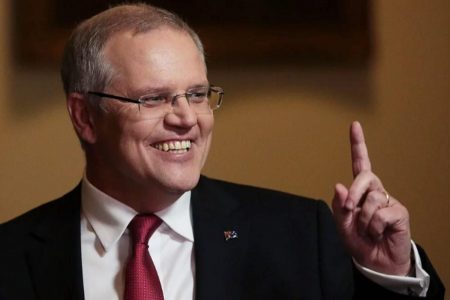
Australia’s Prime Minister leader plays down terror threat at Gallipoli event
Australia’s prime minister played down Thursday any potential link between the arrest of a suspected Islamic State group member in Turkey and a World War I battle commemoration in Gallipoli attended by hundreds of Australians and New Zealanders.
Prime Minister Scott Morrison was responding to media reports that detained Syrian national Abdulkerim Hilef had been planning an attack on the annual dawn service at ANZAC Cove to mark the April 25, 1915, landing of Australian and New Zealand Army Corps troops in an ill-fated campaign to take the Dardanelles Straits.
Morrison said the arrest took place three hours away from the Gallipoli service and no changes to security were made as a result.
“The reports that we are receiving are inconclusive about any link between that arrest and any possible planned event at Gallipoli itself,” Morrison told reporters. “In fact, to make that assumption would be, I think, making a very big assumption.”
A Turkish official agreed that the 26-year-old suspect’s arrest was unconnected to the Gallipoli ceremonies. He was detained in the northwestern province of Tekirdag because he had been in contact with a group of Islamic State group suspects near the Syrian border in the southern Turkish province of Osmaniye, the official said.
The official spoke to The Associated Press on condition of anonymity in line with government regulations that bar civil servants from speaking publicly without prior authorization. It is not clear when the arrest took place.
Morrison said Australian Defense Force Chief Gen. Angus Campbell represented Australia at the service and praised Turkish police and military security.
“I was not concerned for the safety or security of this event,” Campbell told reporters at Gallipoli.
The Australian government estimated more than 1,400 attended the service under tight security involving x-ray screening and armed Turkish military guards.
Concerns over security at Gallipoli escalated last month after an Australian was arrested following the killings of 50 worshippers at two mosques in New Zealand on March 15.
Turkish President Recep Tayyip Erdogan warned that Australians and New Zealanders visiting Turkey with anti-Muslim views would return home in coffins, like their ancestors who fought at Gallipoli.
Morrison slammed the comments as “highly offensive.” He later said Erdogan’s office had explained the president’s words were “taken out of context.”
On Thursday, Erdogan issued a welcoming message of peace, saying it was everyone’s duty to “protect the message of friendship that was etched in Gallipoli on rocks, earth and the sea, through blood, life, determination and courage.”
“A great responsibility befalls us all to ensure that no new war takes place and the generations to come can live in peace,” Erdogan said.
“I commemorate our Gallipoli heroes and salute our guests attending the ceremonies … with sincere feelings,” he added.
Erdogan’s statement did not mention the Syrian’s arrest.
ANZAC Day services were held throughout Australia and New Zealand on Thursday, with Britain’s Prince William laying a wreath in the New Zealand city of Auckland.
On Friday, the Duke of Cambridge is to visit the mosques in Christchurch where 50 Muslims were killed and another 50 wounded.
Attendance at the Gallipoli dawn service has been falling since the centenary in 2015.
But Dennis Basham, global head of sales for On The Go Tours, said his company did not receive any requests to cancel trips to Gallipoli because of the tensions following the Christchurch massacre.
The Australian and New Zealand soldiers Erdogan referred to as leaving Turkey in coffins, actually were buried at Gallipoli.
A monument near the Australian War Memorial in Canberra to the Turks’ victorious military commander at Gallipoli, Kemal Ataturk, is inscribed with his reassuring words to Australians that their war dead “are now lying in the soil of a friendly country.”
Ataturk, the first president of the Turkish Republic, is quoted as saying in 1934: “You, the mothers who sent their sons from faraway countries, wipe away your tears; your sons are now lying in our bosom and are in peace. After having lost their lives on this land they have become our sons as well.”
Neil James, chief executive of the security think tank Australian Defense Association, said Australians and New Zealanders should not expect Turkey to always welcome large-scale Gallipoli commemorations. Increasingly, in Turkey the battle is seen as a religious war.
“It’s the Islamist nationals who are now running the show and I can actually foresee a time when we don’t have major ceremonies at Gallipoli anymore because it just wouldn’t be possible culturally and politically in Turkey,” James said.
“What we’ve taken for granted as having access at the Turks pleasure to the Gallipoli peninsula might not be a long-term proposition,” he said.
Source: AP News





